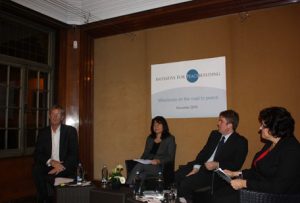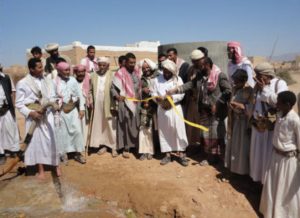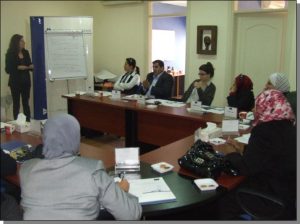As a member of PartnersNetwork, Partners Bulgaria is working towards advancement of sustainable peace in the world, greater involvement of civil society in the transformation and resolution of conflicts, and nonviolent forms of action. Partners Bulgaria is cooperating with PartnersNetwork centers and with international peacebuilding and development organizations to implement projects facilitating achievement of peaceful and conflict sensitive development. Examples of projects are given bellow.
The Initiative for Peacebuilding
As part of European consortium, supported by the European Commission and led by International Alert /2007-2010/, Partners team contributed to increase and develop international knowledge and expertise in conflict prevention in order to ensure that all actors, including EU institutions, can make informed, evidence-based policy decisions in conflict situations. This work took place in more than 20 countries in five continents.
 This work focused on producing evidence-based research to address the root causes of potential or actual conflict and identifying recommendations for policy-makers on preventing conflict and building peace. The project established, and strengthened the capacity of a wide network of organizations across and beyond the EU to advise EU institutions, Member States, host governments and international organizations on a coherent, coordinated and effective approach to conflict prevention. Within the consortium our team work was focused on thematic areas of democratization, capacity building, mediation and dialogue. The PartnersNetwork work took place in Belgium, Georgia, Bulgaria, Slovenia, Poland and the Czech Republic.
This work focused on producing evidence-based research to address the root causes of potential or actual conflict and identifying recommendations for policy-makers on preventing conflict and building peace. The project established, and strengthened the capacity of a wide network of organizations across and beyond the EU to advise EU institutions, Member States, host governments and international organizations on a coherent, coordinated and effective approach to conflict prevention. Within the consortium our team work was focused on thematic areas of democratization, capacity building, mediation and dialogue. The PartnersNetwork work took place in Belgium, Georgia, Bulgaria, Slovenia, Poland and the Czech Republic.
Spotlight on Results:
- Strengthened linkages and dialogue between the field and the EU, and between civil society organizations and officials (in EU and in the field);
- Enhanced knowledge and capacity at a local level to ensure CSOs participation in shaping local policies and practices, especially those related to less represented groups.
- Developed materials and built capacity of CEE NGOs working in the area of international development cooperation to apply conflict sensitive approach to development.
From Early Warning to Early Action
This consortium project continued under the name Initiative for Peacebuilding – Early Warning System: From Analysis to Action /2009-2012/. Our team was involved in work that transitions from policy to action within the context of climate change in Mexico and Argentina. Together with Partners Mexico and Argentina, the team activities focused on providing analysis of existing responses to climate change and building the capacity of civil society to develop early warning systems in these two countries. The team led extensive field research on how the management, access and control of resources impacts conflict dynamics, and the potential for the climate crisis to exacerbate these tensions. Based on our experiences and research, we developed guidance and methodology for conflict-sensitive approaches to climate change for practitioners in any geographic region to examine the impact of climate change in their community or country.
Spotlight on Results:
- Conducted two studies exploring linkages between climate change impacts, vulnerabilities and conflict in Mexico and Argentina;
- Held a series of workshops in Latin America to raise awareness about climate change adaptation and conflict links;
- Lead facilitation of inter-sector consultation among civil society groups in managing disputes and conflicts caused by natural resource competition and environmental factors.
- Developed guidance and methodology for conflict-sensitive approaches to climate change.
Community Based Conflict Mitigation Program in Yemen
Within the PartnersNetwork, Partners Bulgaria and Partners Yemen applied the Community-Based Conflict Mitigation Program (Y-CCM), to assist state and non-state actors in establishing sustainable community structures to reduce conflict over land, natural resources, health services, and education. The program was supported by the European Commission and the British Foreign and Commonwealth Office (2010-2015) and addressed community conflicts in provinces of Mareb, Al-Jawf, Shabwah, Al-Bayda, Abyan, Lahij, Adan, and Ta’izz.
 An initial country assessment conducted in Yemen noted the gaps and opportunities for conflict management and development programming in Yemen, particularly in tribal areas, where most international organizations avoid working due to security concerns. Tribal conflicts constitute a significant challenge to development and democratic reform in Yemen and threaten the stability of Yemen and the wider region. While emerging state institutions are struggling to manage conflict, traditional conflict resolution systems are simultaneously deteriorating. The Program addressed this challenge through capacity building and institutional strengthening to create sustainable mechanisms to address conflict and foster indigenous skills for conflict prevention and peace. Our project activities involved the Yemeni government including the security sector, community and tribal leaders, and community-based organizations.
An initial country assessment conducted in Yemen noted the gaps and opportunities for conflict management and development programming in Yemen, particularly in tribal areas, where most international organizations avoid working due to security concerns. Tribal conflicts constitute a significant challenge to development and democratic reform in Yemen and threaten the stability of Yemen and the wider region. While emerging state institutions are struggling to manage conflict, traditional conflict resolution systems are simultaneously deteriorating. The Program addressed this challenge through capacity building and institutional strengthening to create sustainable mechanisms to address conflict and foster indigenous skills for conflict prevention and peace. Our project activities involved the Yemeni government including the security sector, community and tribal leaders, and community-based organizations.
Spotlight on Results:
- Built trust amongst influential stakeholders from tribal networks and government authorities;
- Established sustainable networks and structures /mediation and conciliation bodies/ to address conflict related to land use, natural resources, educational services, health facilities, and private sector development;
- Built local capacity to deal with issues of common interest and increased number of initiatives taken to prevent and resolve conflicts.
Connecting and Empowering Women CSOs in the Western Balkans Working on Women’s Rights and Gender Equality
With PartnersNetwork office in Brussels in the lead, together Partners Kosovo, the Helsinki Committee for Human Rights in Serbia, and the Women’s Civic Initiative ANTICO in Macedonia implemented this multi-country project to connect and empower Women CSOs in the Western Balkans. This project was designed to increase awareness among municipal authorities and marginalized women leaders of gender equality and women’s rights, while building women leaders’ capacity to develop initiatives and engage in transnational partnerships with other similar CSOs. It was supported by the European Commission /2010-2013/.
Using targeted trainings, our team enhanced municipal and CSO awareness of legal frameworks and public policies related to gender equality, anti-discrimination, and equal opportunity. Through our activities, we increased the capacities of marginalized women leaders to identify obstacles to women’s participation and develop empowerment strategies to overcome them. Partnerships were facilitated between marginalized women from different communities in the Western Balkans in order to create cross-fertilization of ideas and best practices. Through these activities, women participants become better advocates for themselves in their communities and took a more active role in decision-making processes.
Spotlight on Results:
- Enhanced awareness of women’s CSOs and municipal officials of women’s rights and gender equality framework applicable in Kosovo, Serbia, and FYRoM;
- Improved capacity of marginalized women civil society leaders to address women’s lack of civic participation through participatory processes and forums;
- Strengthened skills and reinforced professional capacities of women’s CSOs in the Western Balkans;
- Strengthened municipal-civil society relations that result in joint sustainable partnerships and knowledge sharing;
- Strengthened relations between small-scale CSOs advocating for vulnerable women in the three countries through regular and organized exchanges.
The Women’s Economic Empowerment Program
- Kosovo
 In cooperation with Partners-Kosovo our team successfully increased awareness of existing legal frameworks to protect women’s economic rights and enabled women to participate in economic development in Kosovo. The project was implemented in the provinces of Mamush, Krushe, and Madhe and was supported by the European Commission /2010-2012/. By working with municipal authorities and female civil society leaders from amongst marginalized groups, WEEP built the skills and knowledge capacity of women to develop and implement sustainable economic initiatives. Even more, trainings and activities supported women in developing the confidence and skills to participate in broader civic decision-making processes.
In cooperation with Partners-Kosovo our team successfully increased awareness of existing legal frameworks to protect women’s economic rights and enabled women to participate in economic development in Kosovo. The project was implemented in the provinces of Mamush, Krushe, and Madhe and was supported by the European Commission /2010-2012/. By working with municipal authorities and female civil society leaders from amongst marginalized groups, WEEP built the skills and knowledge capacity of women to develop and implement sustainable economic initiatives. Even more, trainings and activities supported women in developing the confidence and skills to participate in broader civic decision-making processes.
Spotlight on Results:
- More than 300 women participated in capacity building trainings on subjects ranging from anti-discrimination, human rights, and gender equality to project management;
- Women have been provided with tools and resources to develop local business initiatives.
- 12 Cooperative planning sessions to identify community needs and 12 Action Plans developed to guide participating communities.
- Women groups – municipal cooperation have been developed to ensure more gender sensitive local policies and practices.
- Jordan
The program in Jordan, named Empowering Women through Economic Mentorship (WEEM) was implemented in partnership with Partners-Jordan . It aimed to develop the capacities of vulnerable women to engage in local development processes.  WEEM worked to develop mentoring partnerships between successful Jordanian businesswomen and specific groups of vulnerable women from 12 underprivileged Jordanian communities. Project activities centered upon identification of the root causes of women’s limited participation in Jordan’s social and economic life and capacity building. WEEM provided vulnerable women targeted skills training in project management, gender budgeting, and relevant legal frameworks to protect women’s human rights. The project provided support for vulnerable women to actively engage in sustainable economic initiatives at the local level in order to reduce poverty and increase civic participation.
WEEM worked to develop mentoring partnerships between successful Jordanian businesswomen and specific groups of vulnerable women from 12 underprivileged Jordanian communities. Project activities centered upon identification of the root causes of women’s limited participation in Jordan’s social and economic life and capacity building. WEEM provided vulnerable women targeted skills training in project management, gender budgeting, and relevant legal frameworks to protect women’s human rights. The project provided support for vulnerable women to actively engage in sustainable economic initiatives at the local level in order to reduce poverty and increase civic participation.
Spotlight on Results:
- Enhanced cooperation and knowledge sharing between successful Jordanian businesswomen and women living in rural areas in Jordan;
- Increased capacity of rural women to engage in and implement small-scale economic initiatives to benefit their communities;
- Improved awareness amongst both women and local authorities of women’s economic rights and the benefits of women’s participation in local development processes;
- Enhanced participation of women in general decision-making processes, including in local political institutions.

